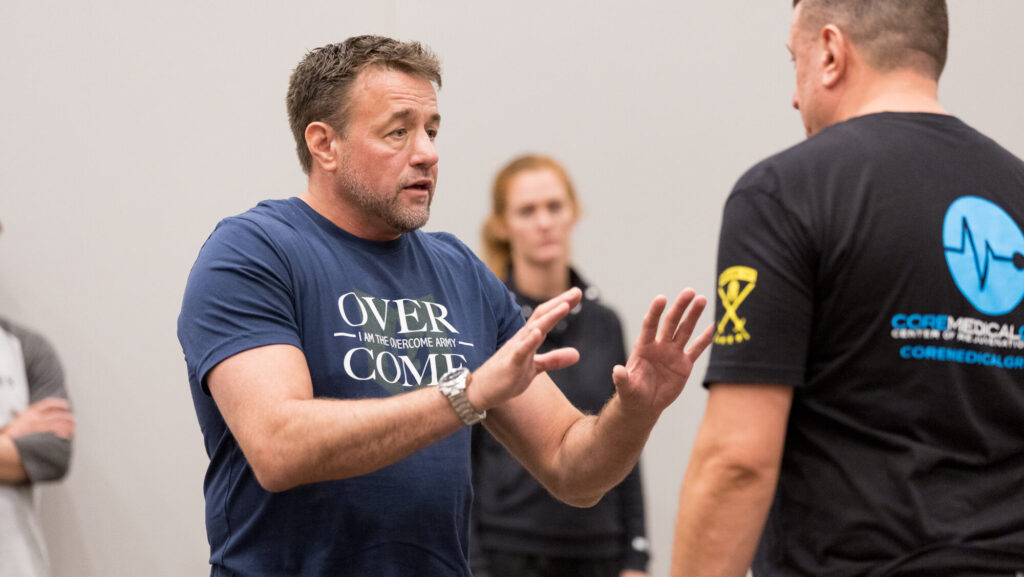In the realm of martial arts, strength, agility, and technique are often the focal points of training. However, an often-overlooked aspect of martial arts—arguably one of the most important—is cultivating a de-escalation mindset. True mastery isn’t just about how well one can engage in a physical confrontation but how effectively one can avoid it altogether.
Surprisingly, many martial arts curricula need to emphasize the importance of de-escalation. Training typically hones in on self-defense and physical prowess, which are undeniably valuable. But this may inadvertently send a message that conflict, once started, is best resolved through combat. This perspective contrasts with real-world scenarios where avoiding a physical altercation is usually the best option, not just for one’s safety but also for moral and legal reasons.

On the floor of a Martial Arts Academy, mastering intricate moves and techniques is both an art and a discipline, highly revered and practiced with dedication. However, for a protection or security professional, the objectives shift significantly. While martial arts skills are undoubtedly beneficial, these professionals are primarily paid to ensure safety and prevent conflict. Their ultimate goal is not to display impressive techniques but to efficiently neutralize threats and, where possible, de-escalate situations without resorting to physical confrontation. The emphasis is more on situational awareness, quick decision-making, and effective communication—traits that go beyond the scope of traditional martial arts training. Thus, while the martial arts realm offers a foundation, the needs and objectives of a
Furthermore, when crafting a training program for your team, it’s essential to integrate the de-escalation mindset into the very techniques you select. This approach isn’t just about practicality but also perception. In today’s society, where many confrontations and interventions can be recorded and swiftly shared on social media, the optics of how we handle potential threats become paramount. It’s about neutralizing a situation effectively and ensuring that the methods appear proportionate and justifiable to the public. This balance is vital, as it can impact public opinion, legal implications, and the reputation of the security team or organization. Therefore, a well-designed program should prioritize techniques that defuse situations and are visually acceptable in our current cultural context.
Considering all these factors, as we begin to craft a program tailored for your personal protection team, we find that the techniques and methodologies we develop diverge increasingly from what’s commonly seen in both the Martial Arts realm and the contemporary defensive tactics training sphere. This disparity arises largely because many program designers don’t invest the necessary time and effort to train across a diverse range of Martial Arts systems. Such a broad-based foundation is crucial because it provides a rich knowledge repository and a wide range of reference materials. By drawing from this extensive pool of techniques and philosophies, we can sculpt something genuinely distinctive and fitting for the unique demands of the protection industry. Instead of relying on generic or traditional approaches, a comprehensive background in various martial disciplines empowers us to create a program that’s both innovative and tailored to the specific nuances of personal protection.
After establishing a solid foundational knowledge, it’s imperative to layer in advanced strategies to instill in your team the core principle of de-escalation:
- React, Don’t Proact: Always allow the potential threat to dictate the necessity for escalation.
- Master the Art of Calm: If your team excels in de-escalation techniques, an aggressor will have to significantly amplify their intent to pose a genuine threat.
- Integrate a series of de-escalation strategies into their training. This process should start with exercises focusing on self-awareness and emotional regulation.
- Train them to identify the precursors of increasing tensions, both within themselves and potential aggressors.
- Equip them with techniques such as deep breathing exercises, effective communication skills, and strategic positioning to neutralize and deter potential threats.
Simulated role-playing exercises, emphasizing verbal negotiation over physical reactions, can be an invaluable tool to drive home these principles.
Drawing from the age-old martial arts doctrine of “winning without a fight,” instructors can pivot their training approach to emphasize the power of mental and verbal tactics over physical altercations. By spotlighting the importance of de-escalation, trainers safeguard their teams and advocate a comprehensive, ethically responsible approach to self-defense and personal protection.

Alan Baker specializes in designing customized Defensive Tactics Programs tailored to the specific needs of law enforcement agencies, security firms, and military organizations. With a focus on practical techniques, scenario-based training, and adaptability to real-world situations, Alan can develop comprehensive training programs that enhance the skills and preparedness of personnel. If you are interested in connecting with Alan or booking his services, please visit our website at https://bakertacticaldesign.com or reach out to him directly through LinkedIn.
